- News
- Reviews
- Bikes
- Components
- Bar tape & grips
- Bottom brackets
- Brake & gear cables
- Brake & STI levers
- Brake pads & spares
- Brakes
- Cassettes & freewheels
- Chains
- Chainsets & chainrings
- Derailleurs - front
- Derailleurs - rear
- Forks
- Gear levers & shifters
- Groupsets
- Handlebars & extensions
- Headsets
- Hubs
- Inner tubes
- Pedals
- Quick releases & skewers
- Saddles
- Seatposts
- Stems
- Wheels
- Tyres
- Tubeless valves
- Accessories
- Accessories - misc
- Computer mounts
- Bags
- Bar ends
- Bike bags & cases
- Bottle cages
- Bottles
- Cameras
- Car racks
- Child seats
- Computers
- Glasses
- GPS units
- Helmets
- Lights - front
- Lights - rear
- Lights - sets
- Locks
- Mirrors
- Mudguards
- Racks
- Pumps & CO2 inflators
- Puncture kits
- Reflectives
- Smart watches
- Stands and racks
- Trailers
- Clothing
- Health, fitness and nutrition
- Tools and workshop
- Miscellaneous
- Buyers Guides
- Features
- Forum
- Recommends
- Podcast
TECH NEWS
Just in: Lapierre Pulsium 700
Seen under some of the FDJ.fr riders in this year’s Paris-Roubaix, the Lapierre Pulsium is designed to take on the worst surfaces in comfort while also getting the power through to the road. We’ve managed to get our hands on the £3,099.99 Pulsium 700 model to see what it’s like on the pothole strewn roads of the south-west, but before we do that let's take a look at some of the technology the French company’s engineers have included in the design.
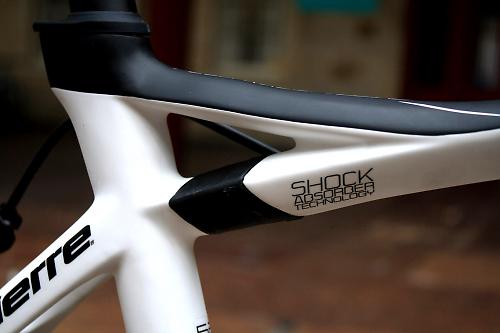
The first thing you’ll notice about the Pulsium is the split top tube design just in front of the seat tube junction. There's a small rubber elastomer in the curved top tube that's intended to absorb vibration from the road surface.
The upper strut – the bit between the top tube and the seat post clamp – is designed to flex enough for the elastomer to compress by a maximum of 3.5mm, according to Lapierre, while acting like a brace to keep things stiff laterally. They say that flex between the two tubes is 27% greater than you get with their other endurance, the Sensium.
The curve from the top tube continues on through to the seatstays, acting like leaf spring suspension, according to Lapierre. The aim is to take out the vibration before it travels up the seat post and through to the rider.
Lapierre have gone for a similar approach with the fork. They’ve created more of a curve in the legs by increasing the offset from 43mm to 50mm. The idea is to provide more shock absorption which should benefit your hands and wrists in the long run.

I’m interested to see what effect this has on handling, though, because increasing the offset reduces the trail (trail is the distance from the centre of the contact point of the front wheel with the ground to the intersection of the steering axis with the ground), and that can make things twitchy.
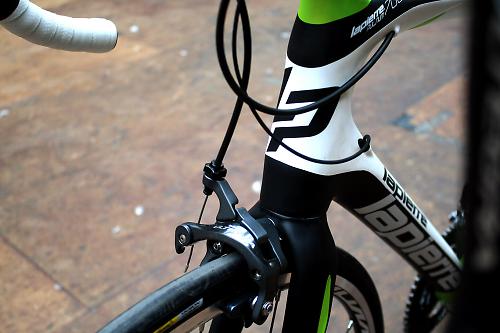
The lower half of the frame is all about transferring power using what Lapierre call Power Box technology. The front section of the top tube, tapered head tube, down tube, bottom bracket area and chainstays are all oversized. Lapierre say they’ve increased the length of the carbon fibres to maximise the amount of stiffness through these areas, so the Pulsium shouldn’t struggle to get the power down.
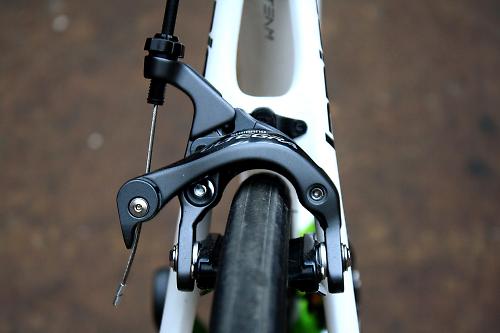
Races like the Tour of Flanders and Paris-Roubaix need big tyres to cope with the cobbles and the Pulsium will take widths up to 32mm thanks to a neat little bracket to adjust the height of the caliper at the rear brake bridge. Saying that, the Ultegra callipers will only take a maximum of 28mm so you'd need to change those too.
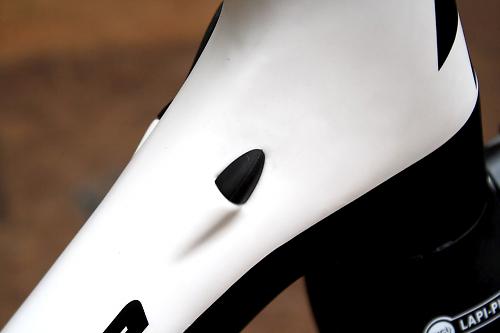
The Pulsium comes in six sizes with top tube lengths ranging from 52cm up to 60cm. Each size gets its own carbon layup to optimise the power and comfort mix I’ve mentioned above, according to Lapierre. This includes the use of both 24T and 30T carbon fibres to get things just right.

The geometry is quite relaxed with our medium having a 165mm head tube length and a 545mm effective top tube. This’ll give a slightly more upright position than on a standard road bike, taking more of your bodyweight off the bars.
The Pulsium is ready for either electronic or mechanical shifting with the internal cables making for a clean look. Also, the cables are kept away from the tube walls to stop any rattling over rough surfaces; there's not much that's more irritating than a buzzing frame on a rough ride.

The 700 model is the top build of three standard models and comes equipped with a full Shimano Ultegra Di2 electronic groupset with an internal seatpost battery. It’s the latest 11-speed version and comes with a decent spread of gears thanks to a 50/34T chainset and 11/32T cassette.
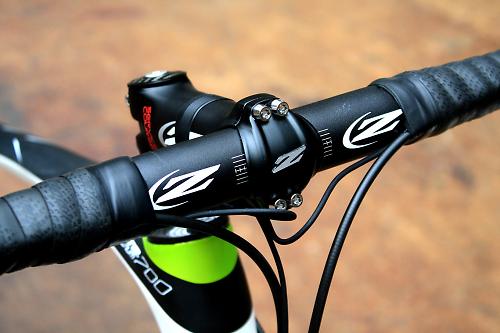
The components are pretty impressive too with Zipp supplying the handlebars and stem, and an Aliante saddle from Fizik.
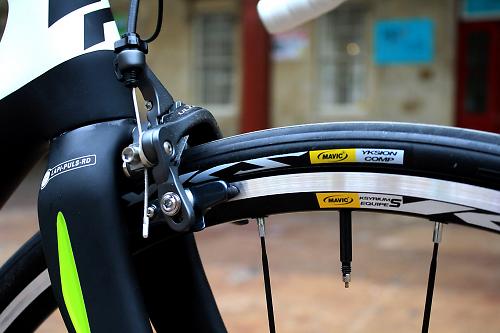
Mavic provide the wheelset with their Ksyrium Equipe WTS and matching tyres – a bit of a budget offering for a three grand bike, but they’ve always shown themselves to be durable and quick rolling.

Other models in the range are the 105-equipped 300 for £1,699.99 and the 500 which comes with mechanical Ultegra for £2,249.99.
Right, the rain has stopped and the sun has come out so I’m off to find some cobbles. The review will be up soon so stay tuned to find out how this one performs. In the meantime, get more info from www.lapierre-bikes.co.uk.
Since writing his first bike review for road.cc back in early 2009 senior product reviewer Stu has tested more than a thousand pieces of kit, and hundreds of bikes.
With an HND in mechanical engineering and previous roles as a CNC programmer/machinist, draughtsman and development engineer (working in new product design) Stu understands what it takes to bring a product to market. A mix of that knowledge combined with his love of road and gravel cycling puts him in the ideal position to put the latest kit through its paces.
He first made the switch to road cycling in 1999, primarily for fitness, but it didn’t take long for his competitive side to take over which led to around ten years as a time triallist and some pretty decent results. These days though riding is more about escapism, keeping the weight off and just enjoying the fact that he gets to ride the latest technology as part of his day job.
Latest Comments
- NoOneSpecial 2 sec ago
They used to, it's now 35% of ownership....
- chrisonabike 47 min 22 sec ago
Does the "super-loud yellow" also help alert (non-deaf / non-earbud-wearing) pedestrians? Or will it just mean dogs bark at me?
- Festus 1 hour 37 min ago
One thing that bothers me is the use of antidepressant med and driving, it never gets picked up by police. Most of these types of medicines state...
- Mr Blackbird 2 hours 3 min ago
Possibly, but I think there will still be a time delay between receiving a warning and looking and the brain processing the image.I guess cycling...
- chrisonabike 3 hours 37 min ago
Indeed - but again these are perhaps questions we should keep asking. Even if the immediate answer is "well we are where we are" or "how on earth...
- wtjs 5 hours 25 min ago
Then smash bad driving behaviour very hard...
- David9694 10 hours 2 min ago
Calls for Oxfordshire transport chief to resign blocked...































Add new comment
9 comments
As a mamil, something comfy to ride in my slippers is just what I need...
Funny how no one has posted how ugly it is as they did for the similarly coloured Merida X4, is this another case of brand snobbery within the cycling community

Care to be more specific? Looks are more than just colour, but styling as well. As for brand snobbery, you couldn't get much more snobbish than Look, and look (hohoho DYSWIDT?) at the comments here on their latest aero bikes.
It's a slippery slope into marketing hell. Started by mountain bike manufacturers of course, with their 'all mountain' and 'freeride' bollox. Bloody hairy-legged clown-short-wearing numpties.
Well said.
IMO it's a thing of beauty. I'll be interested to read how it rides, including the elastomer damping (IIRC that's one of the things Bianchi mocked when touting their CV technology).
I think that this niche is called 'endurance' due to the more relaxed geometry.
Just like 'cross bikes aren't only 'cross bikes anymore; you can have gravel bikes, adventure bikes and so on, it appears that road bikes are continuing to be sold in evermore niche applications.
Coming soon to a Sportive near you...
Two tone bar tape and that seat tube junction. It's not for me.
Pulsium sounds like something related to a bad infection.